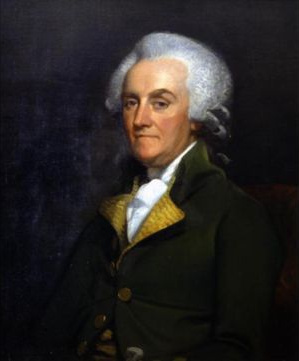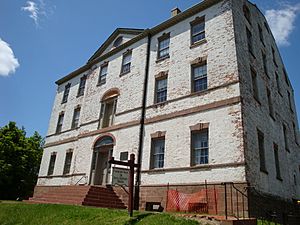William Franklin facts for kids
Quick facts for kids
William Franklin
FRSE
|
|
|---|---|

A portrait of William Franklin, c. 1790
|
|
| 13th Colonial Governor of New Jersey | |
| In office 1763–1776 |
|
| Monarch | George III |
| Preceded by | Josiah Hardy |
| Succeeded by | |
| Personal details | |
| Born | 22 February 1730 Philadelphia, Province of Pennsylvania, British America |
| Died | 17 November 1813 (aged 83) London, England, United Kingdom |
| Spouses |
Elizabeth Downes
(m. 1762; died 1777)Mary Johnson d'Evelin
(m. 1788; died 1811) |
| Relations | Francis Folger Franklin (paternal half-brother) Sarah Franklin Bache (paternal half-sister) |
| Children | William Temple Franklin |
| Parents | Benjamin Franklin Deborah Read (stepmother) |
| Occupation | Soldier, colonial administrator, politician |
William Franklin (born February 22, 1730 – died November 17, 1813) was an American-born lawyer, soldier, and politician. He served as the last colonial Governor of New Jersey from 1763 to 1776. William Franklin was the son of Benjamin Franklin, a famous Founding Father of the United States.
During the American Revolutionary War, William remained loyal to the British Empire. This was very different from his father, Benjamin, who became a key leader for the American Patriots. After being held prisoner by the Patriots, William became a main leader for the Loyalists. He helped organize military groups to fight for the British. In 1782, he moved to Britain and lived in London until he passed away.
Contents
William Franklin: A Life of Loyalty
Early Years and Family
William Franklin was born in Philadelphia, Pennsylvania, which was then a British colony in America. He was the son of Benjamin Franklin, a very important person in the city. His mother's identity is not fully known. William was raised by his father and Deborah Read, who was his father's partner. William always called Deborah his mother.
When he was young, William joined a group of Pennsylvania soldiers in 1746. He became a captain in 1747. He often traveled with his father, including trips to England. William was at least 21 years old when he helped his father with the famous kite experiment in 1752.
As a young man, William was engaged to Elizabeth Graeme. Her family was well-known in Philadelphia. Later, while studying law in London, William had a son named William Temple Franklin.
William married Elizabeth Downes on September 4, 1762, in London. She was from the English colony of Barbados. They moved to the New Jersey colony in 1763. Elizabeth died in 1777 while William was imprisoned during the American Revolution. She was buried in St. Paul's Chapel in New York.
More than ten years later, William married Mary Johnson d'Evelin in 1788. She was a wealthy Irish widow. William's son, Temple, had a daughter named Ellen. William helped raise his granddaughter Ellen. After Mary died in 1811, William continued to live with Ellen. He left most of his estate to her when he died.
Governor of New Jersey
William finished his law studies in England and became a lawyer. Benjamin Franklin worked hard to help his son get an important job. In 1763, William Franklin was chosen to be the Royal Governor of New Jersey. He replaced Josiah Hardy.
William was a good governor. He worked well with the local assembly and made many improvements. He helped improve roads and build bridges. He also worked to get support for farmers from England. William helped create the colony's chancery courts. He encouraged the assembly to give a charter to Rutgers, which is now a state university. He also worked to reduce imprisonment for debt. The Native American Delaware people even called him "Dispenser of Justice." He also helped establish the first Native American reservation in America at Brotherton.
The American Revolution and Divided Loyalties
William's father, Benjamin Franklin, became a leader for the American Patriots. However, William stayed loyal to Britain. This caused a lot of tension between them. Benjamin tried to convince William to join the Patriot cause, but William refused.
William believed in the British Crown's authority. He also needed his salary as governor. In January 1775, he gave a speech to the New Jersey legislature. He urged them to stay with England for prosperity, rather than choose civil war. But the legislature decided to support the Patriots in Boston.
A Leader for the Loyalists
William Franklin continued as governor of New Jersey. He secretly sent reports about Patriot activities to London. In January 1776, colonial soldiers placed him under house arrest. After the Declaration of Independence, he was officially arrested. He was held in Connecticut for two years.
After his release in 1778, William moved to New York City. The British still controlled New York at that time. He became a key leader for the American Loyalists. He worked to get help for them. He also helped create Loyalist military groups to fight against the Patriots. One such group was called "Bacon's Refugees."
Challenges During the War
William Franklin tried to encourage more aggressive actions against the rebels. However, the British Commander-in-Chief, General Henry Clinton, did not always agree with his ideas. Still, Franklin coordinated a group called the Associated Loyalists. This group fought in New York, New Jersey, and Connecticut.
In 1782, a difficult situation arose involving a British officer named Captain Charles Asgill. American General George Washington threatened to execute Asgill. This was in response to actions by Loyalist troops. The British refused to hand over the Loyalist officer responsible. Eventually, the King of France, Louis XVI, stepped in. This led to Asgill's release. This event temporarily stopped peace talks between America and Britain. It was ironic because Benjamin Franklin was a main negotiator for the Americans in Paris at the time.
Life After the War
In October 1781, the British lost the Siege of Yorktown. This made it clear that Britain would likely not win the war. In 1782, William Franklin left for Britain and never returned to America. In London, he became an important voice for the Loyalist community.
William's father, Benjamin Franklin, wrote his autobiography before the war. He dedicated it to William. However, the father and son never truly made up. Benjamin Franklin was firm about not giving money or forgiveness to Loyalists who left the colonies. This was during the peace talks in Paris. The British government gave William Franklin some money for his losses. He also received a pension.
William sent a letter to his father in July 1784, hoping to reconcile. Benjamin replied in August 1784, suggesting they try to forget what had happened. William saw his father one last time in 1785. This meeting was brief and mostly about legal matters. In his will, Benjamin left William very little money. He explained that William's actions during the war were the reason.
William Franklin passed away on November 17, 1813, in London. He was buried in St Pancras Old Church churchyard.
Legacy
- Franklin Township and the borough of Franklin Lakes in Bergen County, New Jersey, were named in William's honor.
See also
Images for kids
-
William Temple Franklin, painted by John Trumbull (1790–1791)
 | Madam C. J. Walker |
 | Janet Emerson Bashen |
 | Annie Turnbo Malone |
 | Maggie L. Walker |



